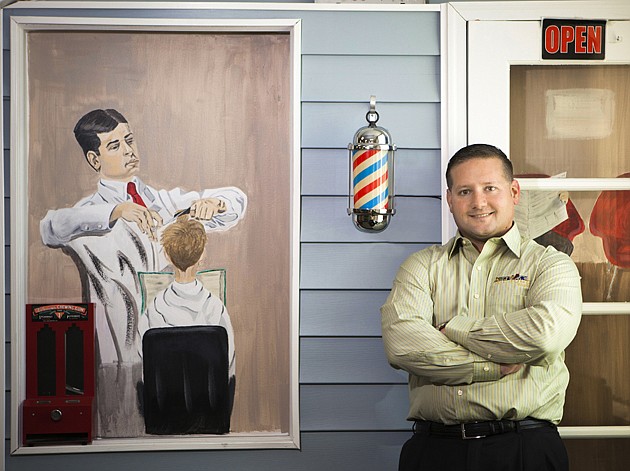Three days after his father's untimely passing in 2009, Michael Plummer Jr. found himself sitting in his dad's office signing payroll checks.
“Sitting in his chair, using his pen, the last check in the book was signed with his signature,” Plummer says. It was the hardest moment of his life, but he knew someone had to keep his dad's business, Our Town America, rolling. That day, “most checks went out with tears on them.”
Learning from the military “to suck it up and do it,” was the only thing that kept him going.
Plummer's father, whom he had worked with side by side for the previous eight years, founded the business 42 years ago, sending a one-time personalized packet of coupons to new residents. The packets feature deals from both mom and pop companies and national chains. Our Town America limits its offerings to one type of business in each zip code, so there can't be two pizza places or two drycleaners in one packet.
A pizza place may offer a free pizza or a salon a free haircut, with the goal of getting new residents to try the restaurant, service or product. “Everyone is trying to get people into the doors — it's new-customer acquisition,” Plummer says. “We give people a reason to go into your location over the others.”
Today 37-year-old Plummer is operating his dad's business, managing 60 employees at the Pinellas Park-based corporate office. The company has hired 16 people at the corporate office this year, with a goal to bring on nine more by the summer.
A quarter of the company's 50 franchisees have launched in the last three years. Last year the company added eight new franchisees and experienced 18% sales growth. It costs $47,500 to open a franchise. Corporate handles the analytics and tools, as well as the printing and mailing of the packets, while franchisees handle local sales in their area.
Plummer aims to bring on 12 more franchisees by the end of 2014. Sending packets to more than 7.5 million families last year, Plummer says he brought in more than $7 million in revenue.
His biggest challenge today is helping businesses understand the value of targeting a niche market like the newly moved family. Daily deal sites have a flawed model, Plummer says, because they are going after changing established habits. What ends up happening is they find customers that are “not really loyal, they're just chasing any discount they can get,” and the sudden rush of business can push loyal clients out.
Sending an oversized envelope with warm inviting colors and a packet of deals that seem too good to be true brings people back to the days when the neighbors would provide a list of their favorite restaurants and specialists, Plummer says. “They think the community is reaching out personally. No one thinks it is advertising, but at the end of the day it is.”
Although the model may sound simple and a bit dated, the data running behind the scenes is more complex than it was at its founding.
“It used to be about buying a list and mailing a list,” Plummer says. Now the company gathers information from credit bureaus, utilities providers, magazine subscriptions and more, to make sure that each household only receives the welcome packet once.
Local businesses providing deals for the packet pay a monthly subscription ranging from $50 to thousands of dollars a month, depending on how many people moved into their zip code that month and how many packets were mailed. The company provides an application to businesses to track the rate of return, response times and best offers. They also send out follow-up mailings and track social media mentions.
The analytics help people determine what zip codes bode well for sponsors and which aren't worth advertising spend, but it all “greatly depends on the offer,” Plummer says. “A buy-one-get-one is not as good as free.”
Plummer says his sponsors in the auto industry report an 8% to 15% response rate, compared with direct mail campaigns that usually see a fraction of a percent. Restaurants can reach 20 to 30% response rates. National hardware retailer Ace is getting a 20% response rate, Plummer says.
Plummer says exclusivity is the company's key. If he already has a small town pizza restaurant as a sponsor, he has to tell the big chain that “There are areas where local mom and pops lock the big chain out.” If that's the case, Our Town America doesn't succumb to a bidding war. Plummer says they apologize and offer a neighboring zip code.
Plummer says his company commits to long-term customers, in an effort to help its sponsors achieve loyal new business. “We are relationship makers. We're not signing people up for a month.”






